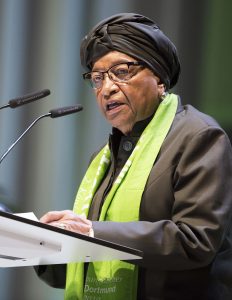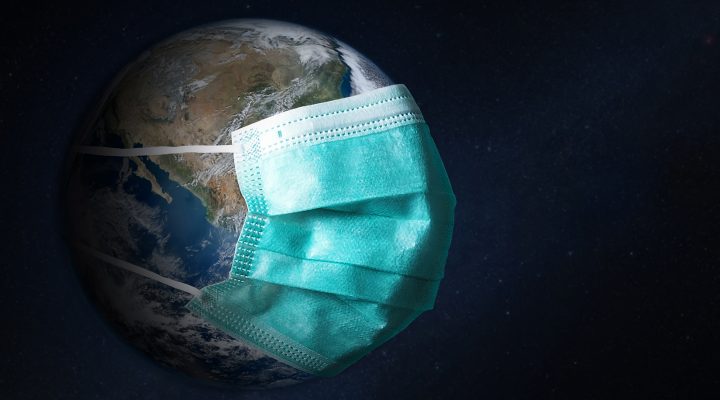In the last four years since COVID 19 struck and devastated the world, a rash of measures have been proposed by health authorities in different countries aimed at curtailing the virus and averting new ones.
Now, some experts say the lesson the world should have learned from COVID don’t seem to have stuck. As far as they are concerned, the possibility of the world witnessing another global pandemic is as high today as it was during the pre-COVID days.
This message is conveyed in a new report titled “No Time To Gamble: Leaders Must Unite to Prevent Pandemics.” It was written by Helen Clark and Ellen Johnson Sirleaf.

Ellen Johnson Sirleaf (Photo by: Elmar Kremser/SVEN SIMON/picture-alliance/dpa/AP Images)
Sirleaf is a former president of Liberia; Clark is former prime minister of New Zealand. Both are past co-chairs of the Independent Panel for Pandemic Preparedness and Response.
Sirleaf was serving as president of Liberia when the Ebola virus hit the West African nation a decade ago and therefore has firsthand experience of what it means to battle a deadly disease.
Right from the beginning of the 84-page report, Clark and Sirleaf sound clear the danger the world faces today by ignorinhg warnings and advice of health experts after the outbreak of COVID in 2019.
“In May 2021, the Independent Panel for Pandemic Preparedness and Response presented a package of evidence-based recommendations to the World Health Assembly that was urgent, ambitious and practical,” they write. “Our goal was to make COVID-19 the last pandemic of such devastation. At the current rate of change, it will not be.”
The three key recommendations were to create a global health threats council with heads of state leadership to ensure political commitment, promote cooperation and increase accountability; adopt a Pandemic Framework Convention within six months under Article 19 of the WHO Constitution; and adopt a political declaration by heads of state and government at the U.N. General Assembly.

Helen Clark (AP Photo/Bebeto Matthews)
The U.N. General Assembly did not hold a high-level meeting on pandemic prevention, preparedness and response until September 2023, two years after the independent panel advised that it be held.
In the face of such complacency, dangerous disease outbreaks such as avian influenza A (H5N1) infecting mammals, including domestic cattle, are reported around the globe, with humans also at risk, the authors warn. And, “a new pandemic threat, Disease X, could emerge at any time.”
“Every day that preparation for a new threat is delayed is a dangerous gamble,” the former heads of state say.
“Three years after we presented our main recommendations … the world remains unprepared to stop an outbreak from becoming a pandemic.”
Their report identifies “complacency” as the “enemy of preparedness.”
“Three years after we presented our main recommendations, despite some progress, the world remains unprepared to stop an outbreak from becoming a pandemic. High-level political momentum has waned, and leaders have shifted their focus to more politically pressing issues,” they state. “Countries, now more indebted and facing higher interest rates than before the pandemic, are not investing the domestic resources required for preparedness and response, while international finance remains insufficient.”
Even the few positive moves that have been made “are not nearly advanced enough or at the scale required,” they warn. “Nor do they focus sufficiently on research and development to build regional resilience or connect enough to one another and to a global system.”
Their assessment: “Too many dangerous gaps and vulnerabilities remain, and pathogens have ample opportunity to spill over, slip through and spread fast.”
The world cannot wait for adoption of a new pandemic agreement in Geneva, which is not likely until 2025 and would take three years to get ratified, the authors state.
With the many deliberations on averting another disaster, the experts would like to see tangible results as time, they say, is running out:
“The recent jump of the avian H5N1 virus to more mammals — including new human cases transmitted from cattle in the United States — portends an influenza pandemic the world is nowhere near ready to manage.”
Global political leaders could make the difference, Clark and Sirleaf suggest.
“Pandemic preparedness starts with strong country leadership, investment and systems.”
“Pandemic preparedness starts with strong country leadership, investment and systems. In an interconnected world where 100,000 commercial flights land every day, we are only as safe as the weakest link in the chain. National policies and investments in communities, systems and capacities are the first line of defense. Based on existing tools and assessments, it is not clear how many countries have integrated the lessons from COVID-19 into their national plans.”
Preparedness takes money, they add. “Without financial investment in public goods, there is no pandemic preparedness or response. Domestic and international investments in pandemic preparedness have been difficult to track.”
What’s needed is billions of dollars, not just millions, they explain.
Among other ideas, the authors advocate a new international system for surveillance, validation and alert regarding pandemic preparedness: “Sensitive surveillance for infectious disease and structures to report events can make the difference between a limited outbreak and a pandemic. Surveillance reporting also extends beyond people — to animals to detect potential spillover events, and beyond, to economic and political spheres, particularly if countries perceive reporting an outbreak as antithetical to their economic interests.”


